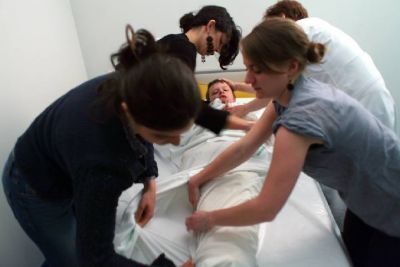Sunday Stillwell Adventures in Extreme Parenthood This week hundreds of thousands will stand up and ask our family, friends, and coworkers to Spread The Word To End The Word. This means I am asking you to stop using the words “retard” and “retarded” because when you do, even if you’re joking, even if you don’t mean it as a slur, even if you’re talking about yourself what you are doing is disrespecting people with intellectual disabilities… people like my sons, Sam and Noah. Would you call my sons retards? Would you say that the ways they stim or perseverate on things is retarded? Of course you wouldn’t, but I have heard it said to them by kids on the playground who think the way Sam jumps up and down and flaps his hands looks strange, or because Noah likes to make loud screeching noises and run in circles. So I…
Tag: activism
Mary Brandenburg and Tony Brandenburg www.theebrandenburgs.blogspot.com Trigger warning: discussion of aversives, restraint and seclusion; mistreatment of disabled people Recently, a story that has been in the headlines regarding treatment of students with disabilities concerned an autistic 4th grade boy in Kentucky. Reportedly, the boy smirked and threw a ball in class. The teachers’ response to this behavior was to stuff him in a duffel bag and tie the drawstring so he couldn’t get out. His mom was called to the school to deal with his behavior. She discovered him when she heard a voice calling from the army bag. Thankfully, he didn’t suffocate, but who can measure the emotional trauma he suffered? Another school in the news, the Judge Rotenberg Center, uses painful electrical shocks, restraint chairs, shackles and seclusion to control the behavior of people with disabilities. This center, which charges $200,000 yearly tuition, has lobbied extensively in Washington…
David Heurtevent www.supportthewall.org France’s population is about 65 million. Assuming an autism prevalence of about 1 in 110, approximately 590,000 autistics live in France. The French education system contains about 13 million students in a two-tiered educational system: most children attend schools overseen by the Ministry of National Education, but approximately 100,000 students found to have significant disabilities — very few of whom have autism — attend schools run by the Ministry of Health. Most autistics are not educated at all. Significantly, childhood psychiatry in France is dominated by psychoanalysts, who (broadly speaking) view childhood behavioral issues as evidence of disturbances in the relationship between the child and the parents, particularly the mother. Psychoanalytic treatment therefore is not behavioral or educational, but seeks to change the child’s emotions. According to Chantal Sicile-Kira, whose autistic son was born in France, autistic children “had no right to an education. Instead, they were…
Shannon Des Roches Rosa www.ThinkingAutismGuide.com Psychiatric survivors during a protest in 1976 Lives Worth Living is a new documentary on the history of the American Disability Rights movement, specifically the critical years from World War II to the signing of the Americans With Disabilities act (ADA) in 1990. It is a necessary, unapologetic, inspiring, instructive, and far-too-short film that could easily beome a series — so many important people interviewed, so many topics covered, so quickly. (For those who want to dig deeper, the Lives Worth Living site includes an interactive timeline of international Disability Rights, and a list of interviewees.) Viewers are given no opportunity to adopt the too-common patronizing perspective towards the disability rights activists in the film — there’s no time, these people have urgent stories to tell about themselves and their movement’s history. Some subjects reject pity outright, as when Ann Ford tells how it felt…
Corina Becker autisticsspeakingday.blogspot.com It started sometime mid-October last year. I was browsing the internet, following links off of Twitter to new places I hadn’t been, when something caught my eye. A new autism awareness campaign, it advertised itself as a way to raise money for charities around the world and for people to understand autism better. Curious, and ignoring the growing dread in the pit of my stomach, I clicked the link and took a look. What I found was Communication Shutdown, an event started by a group in Australia that promoted people to refrain from going on social networking sites such as Facebook and Twitter for one day, November 1st. It said that it would help people to understand the communication difficulties that people with autism struggle with, and this will help people to know autism better. Also, for a $5 donation, people would get a charitable app to…
Autism activist Dana Commandatore of RethinkingAutism.com is the mother of an autistic boy. She hopes for a better quality of life for autistic people and their families. Dana says, “Through acceptance and understanding we can make progress.” We agree, which is why we asked to interview her about her site, and the provocative and much-needed autism videos she creates. From the RethinkingAutism.com home page: All too often in the world of autism, celebrity and sex appeal are used to promote pseudo-science and personal agendas. RethinkingAutism.com wants to change minds, change the current media conversation and help give autistic people a more prominent voice in the conversation. Up to this point, certain celebrities and some parents of autistic children have dominated the media with their miracle cures and unsubstantiated theories on causation. This exploits autistic people, their family members and the public. Please join us. Share the videos, read the blog…
The Thinking Person’s Guide to Autism (TPGA) started with a brainstorm in a California parking lot May 27, 2010. We published our first post 9 days later, on June 6: The Thinking Person’s Guide to Autism (TPGA) is the book and website we wish had been available when our children with autism were first diagnosed. We want to help people with autism and their families make sense of the bewildering array of available autism treatments and options, and determine which are worth their time, money, and energy. Think of us as a little bit of Snopes for the autism community — trusted, accurate, and friendly. Our essays will cover informed approaches to autism and autism treatments, as well as the personal experiences of people with autism and their families. Our attitude is cautionary yet loving — we’re honest, but we’re not interested in negativity. We — the TPGA editors —…
Caitlin Wray www.welcome-to-normal.com I have a neighbour who can’t say “autism.” Both of us having two young kids, we had a casual chat on the lawn the other day as neighbours often do, about the usual stuff. Except of course, the “usual stuff” for parents like us will strike others as highly unusual. It’s hard to make small talk about our kids without autism finding its way into the conversation. It used to make me uncomfortable; it can be awkward to find succinct ways to weave such a complex situation into an informal chat. But I no longer let society’s discomfort with autism deter me from talking about “it,” because “it” is part of who my son is, and indeed has become part of who I am. If my neighbour gets to talk about her daughter’s ballet class, then damn it all, I get to talk about my son’s karate…


